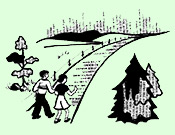
By Lois E. Wilson
As people on Earth began to populate various regions of it, different languages arose from their daily activities and knowledge. This is still happening today. For example, in recent years from scientific and technological discoveries and developments, many new words have been added to each country’s vocabulary.
Another source of this increase is the slang people use. It can be “jargon” which is defined as special words or expressions of a certain population about particular items, activities, or professions: sawbones, ambulance chasers, and bean counters. Acronyms from the military such as “SNAFU” have been adopted as words and used by others.
Slang can be a newly coined word, multiple words put together, or familiar words which are used in a fresh way and given an additional meanings.
Some slang words and phrases have come from the area of sports: zebra (referee), three-bagger (triple), getting to first base, second base—you know the implied score.
Names of people have been given new meanings. “Annie” or “Annie Oakley” are slang terms for free passes or tickets to games and entertainment. The terms are believed to originate from her ability to shoot and hit a playing card thrown into the air—it then looked like a punched ticket.
Slang words are often used in daily speech; their definitions may be in urban or slang dictionaries. If they have been adopted by the masses, they can become traditional dictionary entries. The popular and new words of the year are considered for such recognition. The word of 2020 was “pandemic.” Other popular words were” incogitant” (thoughtless and inconsiderate), “defund” (take funds away from) and “lockdown” (officially restricting the activities or business in a community).
Slang words and phrases are generational; some persist in our vocabulary and some fade away. Some are lewd and seldom used in public. These are some from the past. I was a bobby-soxer. There are hairstyle terms which have earned a place in our vocabulary: bobs, page-boys, shags, pigtails, pony tails, and updos with buns. Occasionally you still see the mullet haircut.
Most of us try to use acceptable words when we speak. We usually don’t realize the origin of many of our words was based on slang used by others at different times in history. These words and phrases make our language more interesting, descriptive, and colorful. John Moore is quoted as observing, “Slang is a poor man’s poetry.”
We may not be erudite, but we can console ourselves with the thought that slang is at least a product of creativity.

